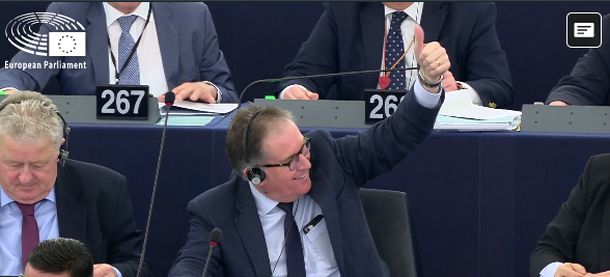
In a statement last week, the EU Commission again omitted a central point from the UN opinion on natural resources in Western Sahara : the Sahrawis’ wishes.
“I am afraid that Commissioner Borg has been ill advised”, stated the former UN Legal Counsel and UN Under-Secretary General for Legal Affairs, Mr. Hans Corell, last year, after learning one of the many strange conclusions the EU had drawn from the analysis he made to the UN Security Council in 2002.
During the controversies over the EU fishing in the waters off Western Sahara, the EU has used, and still uses, the 2002 UN opinion in search for legal arguments.
Again, last week, the EU Commission used the analysis to defend the fisheries. And once more, the EU Commissioner seems to have been erroneously advised. The Corell opinion is completely misrepresented:
“With respect to the present situation, according to the legal adviser to the Secretary-General of the United Nations (12 February 2002) and on the basis of international law, activities related to natural resources undertaken by an administering power in a non-self-governing territory are not illegal so long as they are not undertaken in disregard of the needs, interests and benefits of the people of that territory”, stated Mr. Joe Borg , European Commissioner for Fisheries and Maritime Affairs.
The statement came as a reply on 9 October 2009 to questions from two Green MEPs, Caroline Lucas and Raül Romeva (see questions at the end of this article).
The Commissioner’s argument, which the EU also has stated before, is basically that the fishing in Western Sahara is allowed because they, and Morocco, know what is in the interests of the people of Western Sahara, and how well the people will benefit from financial contributions. The Commission has repeatedly tried to find support in the UN 2002 opinion for that argument. But it is impossible.
The Legal Opinion does not refer to the “needs, interests and benefits”, as a criterion for legality, such as the Commissioner stated last week. The three words are more or less synonymous.
What the UN opinion states is that natural resource exploration and exploitation would be in violation of international law if it is “in disregard of the interests and wishes of the people of Western Sahara.” Download the 2002 UN legal opinion here.
The word that keeps escaping the Commission’s mind is “wishes”.
“It is quite straightforward, and therefore it is rather incomprehensible that the EU Commission never gets the point in the UN legal opinion,” said Sara Eyckmans of Western Sahara Resource Watch.
“The Sahrawi have a right to self-determination over their territory and its natural resources, meaning they have the right to decide on the future status of the territory and its possessions. The wishes of the Sahrawi people are part of that sacred trust that the EU cannot look away from. This is a key point to understanding the entire concept of self-determination, which the EU is claiming to defend. Ignoring the Sahrawi people’s rights to self-determination, is exactly why the fisheries agreement is both in violation of international law and highly unethical”, said Eyckmans, underlining it is not sufficient to just give money to the Moroccan government for projects in Western Sahara.
Another unclear point in the Commissioner’s statement, is that it gives the impression that the EU believes Morocco to be the administering power in Western Sahara . It is not.
The same legal opinion that the Commissioner refers to, states clearly that Morocco is not the administering power of Western Sahara. The legal analysis to administering powers was done by analogy. Since Morocco is only de facto administering the territory, stronger regulations apply. But in the Commissions texts, to the contrary, the UN conclusion is rather softened. In the Commissioner’s latest reply, the legal argument has been switched from the UN positive version: “in violation of international law […] if…” to a double negation from the EU: “not illegal...unless”.
UN expert embarrassed
The last years’ misrepresentation by the EU Commission of the UN legal opinion in 2008 prompted reactions from the author of the UN opinion itself.
"As a European I feel embarrassed. Surely, one would expect Europe and the European Commission - of all - to set an example by applying the highest possible international legal standards in matters of this nature", Mr. Hans Corell stated in a law conference in South Africa, December 2008.
"It has been suggested to me that the legal opinion that I delivered in 2002 had been invoked by the European Commission in support of the Fisheries Partnership Agreement. I do not know if this is true. But if it is, I find it incomprehensible that the Commission could find any such support in the legal opinion , unless of course the Commission had ascertained that the people of Western Sahara had been consulted, had accepted the agreement and the manner in which the profits from the activity was to benefit them. However, an examination of the Agreement actually leads to a different conclusion".
“According to an article in EU Observer on 9 March 2006 under the title ‘Commission under fire over Morocco fisheries agreement’, EU fisheries commissioner Joe Borg has stated that Morocco is the de facto administrator of Western Sahara and therefore (my emphasis) the Commission proposal is in conformity with the legal opinion of the United Nations issued in January 2002 [...] If this reference is correct, I am afraid that Commissioner Borg has been ill advised"
EU support inside occupied territory
It is also interesting to note that the Commissioner now states that EU is supporting fisheries sector in Western Sahara. This is done despite the fact that Western Sahara is not mentioned in the Fisheries Agreement between Morocco and the EU.
It is not known if the EU has done anything to find out if the people of Western Sahara want these projects on their land. The Sahrawi Arab Democratic Republic earlier this year declared Economic Exclusive Zone for the waters offshore Western Sahara.
E-3756/09EN Answer given by Mr Borg on behalf of the Commission (9.10.2009)
The Commission is aware that the self-proclaimed Saharawi Arab Democratic Republic (SADR) [1] declared its jurisdiction over a 200 miles Exclusive Economic Zone (EEZ) off the Western Sahara.
The question of the status of Western Sahara, including the declaration of an EEZ, is a complex problem which should be resolved both bilaterally between the parties concerned and within the multilateral framework of the United Nations. In this context, the EU supports the efforts of the United Nations Secretary-General to reach a just and sustainable solution, which is acceptable to the parties concerned, while preserving the principle of self-determination of the people of Western Sahara. This would also relate to the question of jurisdiction over the waters off the Western Sahara.
With respect to the present situation, according to the legal adviser to the Secretary-General of the United Nations (12 February 2002) and on the basis of international law, activities related to natural resources undertaken by an administering power in a non-self-governing territory are not illegal so long as they are not undertaken in disregard of the needs, interests and benefits of the people of that territory.
In its opinion of 20 February 2006, the Parliament’s Legal Service shared this point of view with regard to the Fisheries Partnership Agreement (FPA) between the European Community and Morocco.
Finally, it should be recalled that the annual financial contribution paid by the Community to Morocco in the framework of the FPA amounts to € 36.1 million, of which at least € 13.5 million are to be used to support the fisheries policy and the implementation of responsible and sustainable fisheries. Support for the fisheries sector, including in the Western Sahara region, is one of the elements of the aforementioned policy and is taken into account in the programming of measures to be undertaken within the framework of this Agreement.
[1] Not recognized by the EU Member States.
WRITTEN QUESTION E-3756/09
by Caroline Lucas (Verts/ALE) and Raül Romeva i Rueda (Verts/ALE) to the Commission
Subject: Western Sahara resources
In January 2009, the Government of the Saharawi Arab Democratic Republic (SADR) declared a 200-nautical mile Exclusive Economic Zone (EEZ) in the context of its jurisdiction over its offshore fisheries and mineral and petroleum seabed resources, as provided for under the UN Convention on the Law of the Sea.
Under the terms of the fisheries partnership agreement with Morocco, EU-flagged vessels have been pursued fishing activities in the waters included in this declaration of jurisdiction (see answer to question E-4295/08 by Commissioner Borg).
Since Morocco has never declared jurisdiction over these waters, the government of the SADR appears to be the only body that has ever declared such jurisdiction.
Was the Commission aware that such a declaration was made?
What is the Commission's view of the legal status of the declaration? What effect does it have on the EU's bilateral fisheries agreement with Morocco?
Does the Commission agree that the terms of the bilateral agreement should be clarified to specifically exclude the waters south of 28º 44´ North latitude, so as to avoid any possible prejudice to the international status of Western Sahara?
If the Commission does not consider that the declaration has any effect on the conditions of access for EU vessels to the waters off Western Sahara, could it please explain its reasoning in detail?
---------------------------------------
Here is the EU Council's legal advice on fishing in occupied waters
Hans Corell criticizes EU fisheries in Western Sahara
The former Legal Counsel to the UN Security Counsel, Mr. Hans Corell, comments on the EU's fisheries activities in Western Sahara.
EU Court reaffirms position on Western Sahara
Polisario has a case, but it should be pursued when the time is right, Court implies.
European Parliament disregards Court and adopts Morocco fish deal
Notwithstanding four consecutive rulings of the EU's highest Court calling such a practice illegal, the European Parliament has just now voted in favour of the EU-Morocco Fisheries Agreement that will be applied to the waters of occupied Western Sahara.


